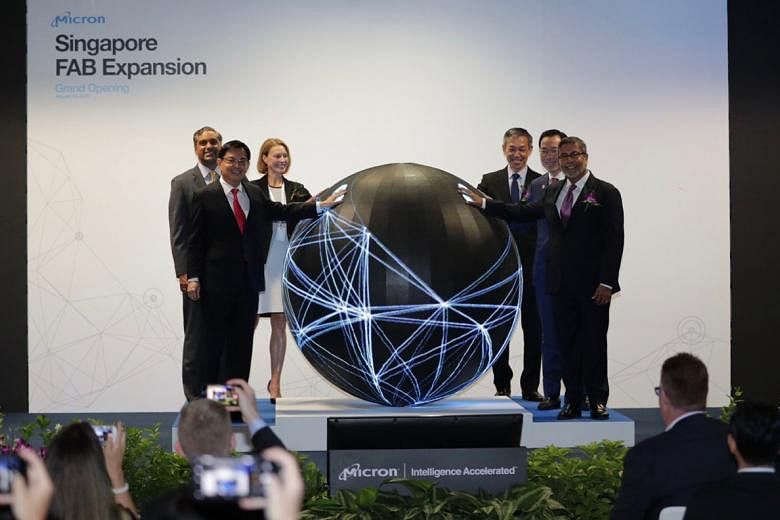SINGAPORE - Singapore is well-positioned to meet the global demand for semiconductors, which remains strong in the long term, said Deputy Prime Minister and Minister for Finance Heng Swee Keat.
He was speaking at the opening of the new and expanded facility of semiconductor manufacturing firm Micron Technology in North Coast Drive in Woodlands on Wednesday (Aug 14).
The expansion will add new cleanroom space to enable continued 3D Nand technology transitions and expand research and development capabilities adjacent to its existing Nand manufacturing complex. 3D Nand flash is a type of flash memory in which memory cells are stacked vertically in multiple layers. This achieves higher densities at a lower cost per bit.
The expansion will add over 1,000 new jobs in Singapore. It has about 8,000 staff members now.
Mr Heng said: "No doubt the global semiconductor industry is experiencing headwinds this year due to global market uncertainties. But these headwinds should be viewed in the context of the 'semiconductor super cycle' which took place in the preceding few years - where global demand grew by more than 35 per cent."
He said recent forecasts suggest that global demand could return to modest growth in 2020, and growth is projected to grow at between 2 per cent and 9 per cent per year in the subsequent few years.
His comments come after figures out on Tuesday showed a 14.6 per cent plunge in Singapore's exports in the second quarter, on the back of slowing global demand for electronics, especially semiconductors, and worsening trade conditions. Exports of electronic products contracted 26.9 per cent in the quarter due to drops in integrated circuits, disk media products and personal computers.
But Mr Heng said there are good reasons to believe that demand for semiconductor chips will continue to grow.
"Beyond smartphones and tablets, the consumer demand for other smart devices ranging from TVs to wearables is growing. We are also seeing the rapid advancement and deployment of new innovative technologies... the rapid deployment of these technologies will boost demand for semiconductor components," he added.
Micron's expansion will help meet this demand by expanding its capacity to produce advanced 3D Nand flash memory chips, which are used to produce solid state drives that are used in smartphones, tablets and computers. Such drives are also being increasingly deployed in data centres.
Mr Heng said the semiconductor industry in Singapore has seen many business cycles.
"Each time, our companies weathered the downturn, took the opportunity to transform and emerged stronger."
Singapore accounts for 11 per cent of the global market share for semiconductors and is home to more than 60 semiconductor companies. The industry also accounts for more than 7 per cent of Singapore's gross domestic product and is one of the largest industries within the manufacturing sector.
The industry employs around 35,000 people here.
As one of these semiconductor companies, Micron established its Singapore presence in 1998 and has invested more than US$15 billion (S$20 billion) here over the years.
Mr Heng said Singapore is well-positioned to meet the global demand for semiconductors but has to keep itself relevant as a semiconductor hub..
"The global semiconductor industry is extremely competitive. To remain relevant as a semiconductor hub... Singapore will need to build on its strong foundations of good connectivity, a pro-business environment and a skilled and adaptable workforce," he said.
"We will need to continue to strengthen our semiconductor ecosystem. This includes closer collaboration between semiconductor manufacturers and their suppliers, many of which are small and medium-sized enterprises... We must continue to invest for the longer term and strengthen our ecosystem. This way, we will be ready to harness new opportunities when the global demand picks up."
This strengthening of the semiconductors ecosystem is also part of the wider transformation of Singapore's electronics sector, he said, noting that new technologies such as artificial intelligence, the Internet of Things and 5G augur well for semiconductor demand.
Micron president and chief executive Sanjay Mehrotra said: "We look forward to continued collaboration, innovation and success with local suppliers, universities and government entities in Singapore whose strong partnerships have made this expansion possible."



